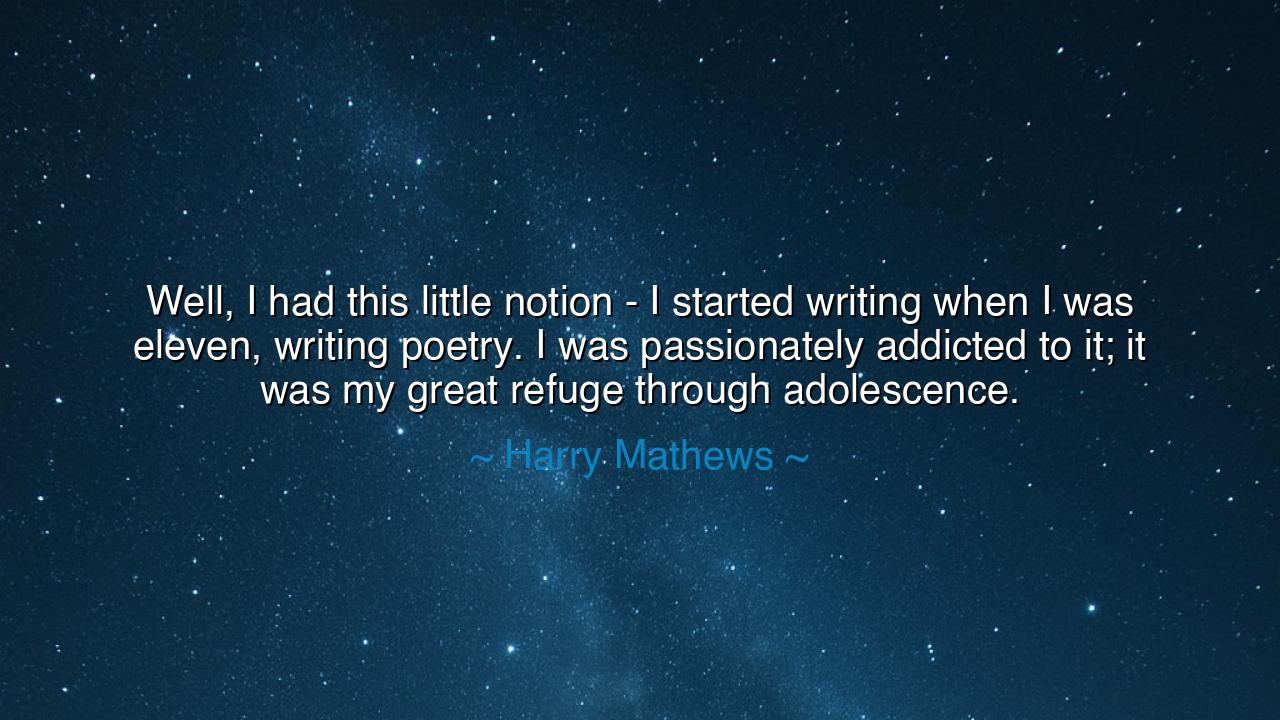
Well, I had this little notion - I started writing when I was
Well, I had this little notion - I started writing when I was eleven, writing poetry. I was passionately addicted to it; it was my great refuge through adolescence.






Hear the voice of Harry Mathews, poet and seeker, who spoke with the memory of youth: “Well, I had this little notion—I started writing when I was eleven, writing poetry. I was passionately addicted to it; it was my great refuge through adolescence.” In these words we find not just the story of a man’s beginnings, but the eternal testimony of art as sanctuary. For Mathews tells us that poetry is not mere ornament, but a refuge, a shelter built from words against the storms of life.
The meaning of refuge is sacred here. For adolescence is a season of turmoil—of doubts rising like waves, of desires burning without compass, of loneliness pressing upon the spirit. Many in such years lose their way, seeking escape in destructive paths. But Mathews found sanctuary in poetry. It became his fortress, not of stone, but of rhythm and imagination. What others saw as a pastime, he embraced as salvation. His addiction was not to destruction, but to creation, and thus his refuge became the seed of his destiny.
The ancients knew this power well. The psalmists of Israel poured their anguish and hope into verses that still sing today. The Greek youth, struggling with the passions of growth, turned to the lyre and to verse to shape their feelings into beauty. In Rome, Ovid wrote of love and loss with the fire of one who transformed inner turbulence into song. Mathews’ confession is no different: he joined the lineage of those who, in their youth, found in poetry a way to master chaos, to give order to the storm within.
History offers us many mirrors. Consider Anne Frank, who in her hidden room wrote not poetry, but words of reflection and yearning that have endured as one of the most profound testaments of the human spirit. Her diary became her refuge, a way to make sense of fear and confinement. Though the world outside her window fell into darkness, her words created light that has not been extinguished. Like Mathews, she shows us that writing in youth is not a pastime, but a lifeline.
Mathews’ words also remind us of the mystery of beginnings. At eleven, he had only a little notion—the small spark that would grow into the fire of his life’s work. How often do the greatest journeys begin with such small beginnings! A child scribbling verses, a painter sketching by candlelight, a thinker with a single question—these beginnings, humble though they seem, contain within them the seeds of greatness. We must not despise such sparks, for they may grow into lights that guide whole generations.
The lesson for us is clear: seek out your refuge in creation, not destruction. When storms come—and they will—let your heart find strength in art, in writing, in music, in any act that turns pain into beauty. For it is better to be passionately addicted to creation than to despair. And if you are young, or guiding the young, remember that even the smallest “little notion” may become a life’s calling. Encourage it, nurture it, and protect it, for it may be the soul’s way of saving itself.
Practical wisdom flows from this. Begin to write, even if your words stumble. Take up pen, brush, or instrument, and let your inner storms pour into form. When despair comes, channel it into creation. When loneliness whispers, answer with song. And above all, honor the “little notions” that stir within you, for they may be the seeds of transformation.
Thus, Harry Mathews’ words endure as testimony: poetry can be a refuge, a salvation, a shaping force for the soul. Let us teach future generations that art is not luxury but necessity, that in creating we save ourselves, and that in the humble act of writing, drawing, or singing, we may find the path through darkness into light.






NMNguyen Minh
I find this quote deeply human because it connects creativity to emotional survival. Many writers start young, not out of ambition, but from a need to make sense of themselves. For Mathews, poetry seems like both salvation and obsession. I wonder, though, whether relying so heavily on writing as a refuge risks isolating a person from real-life experiences. Can an artist ever truly separate their art from the emotions that first drove them to create?
TAThu Anh
This statement feels both tender and nostalgic. There’s something beautiful about finding comfort in art when the world feels overwhelming, especially during youth. I’m curious whether writing remained a refuge for Mathews throughout adulthood or if it transformed into something else—a discipline, a profession, maybe even a burden. Do you think creative passion that begins as an emotional escape can evolve into a more balanced, mature form of artistic pursuit?
NHNguyen Hoang
What stands out to me here is the idea of discovering one’s passion so early in life. Starting to write poetry at eleven suggests a kind of emotional depth or sensitivity unusual for that age. I’d love to know what drove him—was it loneliness, curiosity, or an inner compulsion to express himself? It also makes me think about how early creative habits can shape a person’s entire identity, especially through turbulent years like adolescence.
CPCuong Pham
This reflection really captures how creative expression can serve as a lifeline during adolescence. I relate to that idea of writing as refuge—it’s such a powerful outlet for emotions that can’t easily be spoken. But I wonder, does becoming 'addicted' to writing suggest a healthy escape or a form of withdrawal from reality? I’d be curious to know whether Mathews saw poetry as a way to process his world or to hide from it entirely.